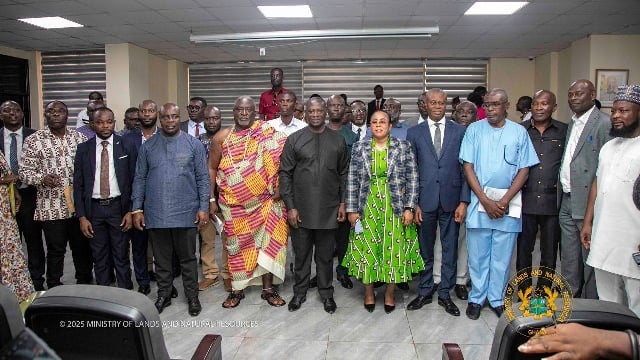The Minister for Lands and Natural Resources, Emmanuel Armah-Kofi Buah, has reaffirmed the government’s determination to overhaul Ghana’s land administration system through sweeping reforms and digital innovation.
Speaking at the inauguration of the Greater Accra Regional Lands Commission Board, the Minister described Ghana’s current land governance framework as riddled with challenges that continue to hinder development and frustrate citizens.
Highlighting issues such as prolonged litigation, cumbersome bureaucracy, and widespread opacity in land transactions, Mr. Buah stressed that resolving these problems is central to the Mahama-led administration’s broader national Reset Agenda.
“Land must be secure, accessible, and efficiently administered to empower Ghanaians and catalyse national development,” the Minister declared.
He noted that the Lands Commission’s digital transformation through the Enterprise Land Information System (ELIS) would play a critical role in eliminating outdated manual processes and drastically reducing corruption within the sector.
“The Commission’s ongoing digitisation through the Enterprise Land Information System (ELIS) will eliminate manual inefficiencies and significantly reduce opportunities for corruption,” he affirmed.
Mr. Buah tasked the new board with driving three urgent priorities:
Accelerating decentralisation of land services to bring them closer to local communities.
Enforcing compliance with allodial title registration in line with Section 182 of the Land Act, 2020 (Act 1036).
Enhancing collaboration with the judiciary to fast-track the resolution of land disputes.
“We expect this board to be agents of transformation,” he said. “Your mandate includes bringing the Lands Commission closer to communities and delivering efficient, transparent, and professional services.”
The Greater Accra Regional Minister, Linda Akweley Ocloo, echoed the urgency of the moment, warning that the region is under siege from intensifying land-related conflicts, land guard operations, and illegal encroachments on public property.
“The situation demands urgent, decisive action,” Madam Ocloo stressed. “This board must implement practical measures to restore integrity in land administration and rigorously protect state lands from illegal occupation.”
Newly sworn-in Board Chairman Isaac Nii Djanmah Vanderpuye accepted the charge with a pledge to deliver on expectations.
“We recognise the enormity of our task,” he acknowledged. “This board will work tirelessly to modernise land services and rebuild public trust in the system.”
The new board is expected to play a key role in delivering efficient, accountable, and community-centered land administration as Ghana pursues a more transparent and development-oriented future.


